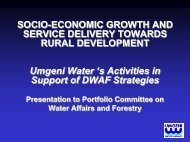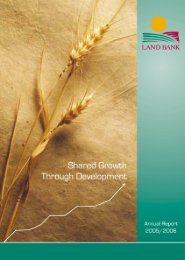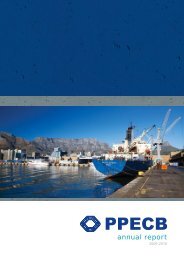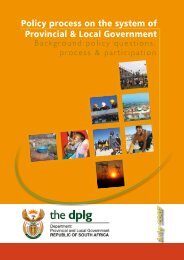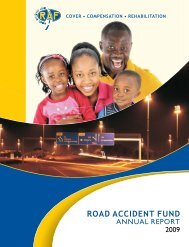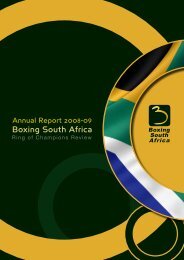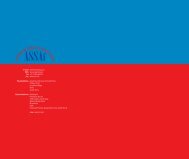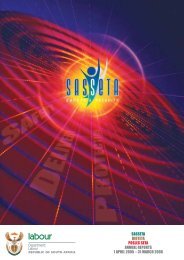Human Settlements Review - Parliamentary Monitoring Group
Human Settlements Review - Parliamentary Monitoring Group
Human Settlements Review - Parliamentary Monitoring Group
You also want an ePaper? Increase the reach of your titles
YUMPU automatically turns print PDFs into web optimized ePapers that Google loves.
<strong>Human</strong> <strong>Settlements</strong> <strong>Review</strong>, Volume 1, Number 1, 2010<br />
disabled civil society.”<br />
In this nature-culture divided world discussed<br />
above, the “myth” around nature has been<br />
turned into reality which is well illustrated by<br />
our role of language. Nature in our current<br />
predominant mindset is made in the image of a<br />
commodity, a ‘natural resource’, underpinned<br />
by a philosophical stance that views humans<br />
as standing apart from the rest of the living<br />
world. This is a good example of ‘shallow<br />
ecology’ or ‘weak sustainability’ whereby only<br />
instrumental, or ‘use’ value is ascribed to<br />
nature. We need to be careful of our language<br />
and careful not to be seduced by jargon<br />
and slogans such as ‘eco-friendly’, ‘ethical<br />
hunting’, ‘sustainable utilisation’, ‘downsizing’,<br />
‘transparency’, ‘biodegradable’, and ‘growth’.<br />
Jargon and slogans can illustrate the dilution<br />
of the ‘sustainable development’ concept, i.e.<br />
are we simply ‘sustaining development’ or<br />
working towards sustainable development<br />
“We are accustomed to thinking about the<br />
Western cultural synthesis as a developmental<br />
endpoint which points towards the control<br />
of all natural forces by human decisions”<br />
(O’Sullivan 2008, 132). The development<br />
of modern Western science and expertise<br />
is suffused by the underlying belief that all<br />
forces can be contained and controlled by<br />
scientific inquiry and technological advance. It<br />
is critical to question some of our assumptions,<br />
and some of the things that we think of as<br />
normal. Edmund O’Sullivan (2008, 132) in<br />
‘Re-enchantment of the natural world’ tells us<br />
that it wasn’t always this way. Understanding<br />
the historical roots of our dominant mode of<br />
thinking allows us to see that this is not the<br />
only way of thinking and, indeed, that we live<br />
in a different historical moment with a different<br />
challenge facing us. Instead of considering<br />
ecological thinking as fringe or alternative<br />
and reductive scientific economic thinking as<br />
normal, we should ask which type of thinking<br />
or worldview is best suited to the challenges<br />
we face. Is it normal to face a global ecological<br />
crisis in a divide and conquer (reductive)<br />
way while separately treating a global crisis<br />
of human rights, of increased militarisation<br />
Questions of sustainability have in general<br />
become pertinent to many more disciplines<br />
than we would traditionally associate with it.<br />
Enough is now known to upset profoundly<br />
our everyday notions of space, time, matter<br />
and energy. Design is the discipline entrusted<br />
with the construction of space. <strong>Human</strong>s have<br />
torn themselves from the rest of nature, and<br />
sustainable design is a way to repair the rift.<br />
As planners and designers we need to design<br />
so artfully and carefully as to help reconnect<br />
people to nature and to their places (Orr 2007,<br />
par 11). As design professionals we hold the<br />
keys to creating a far better world than that<br />
in prospect, but only if we respond creatively,<br />
smartly, wisely and quickly to these facts (Orr<br />
2007, par 11).<br />
Resurrection of the Natural World and<br />
Values Revisiting Concepts, revising<br />
Paradigms<br />
The concepts and arguments underpinning<br />
a sustainable future and the need for society<br />
as a whole to revisit and rethink the way<br />
in which we utilise our natural assets have<br />
been in the mainstream for decades. Yet<br />
even with the strongest ecological evidence<br />
supporting these concepts, i.e. that there are<br />
124



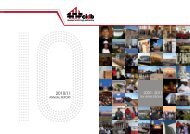
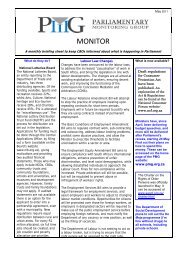
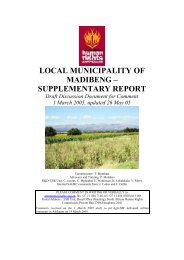
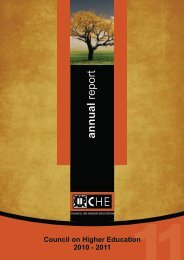
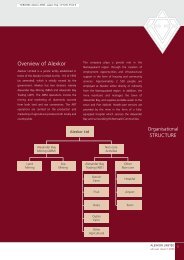
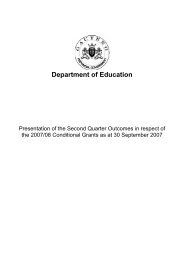
![National Research Foundation Annual Report 2008 / 2009 [Part 2]](https://img.yumpu.com/49774036/1/177x260/national-research-foundation-annual-report-2008-2009-part-2.jpg?quality=85)
